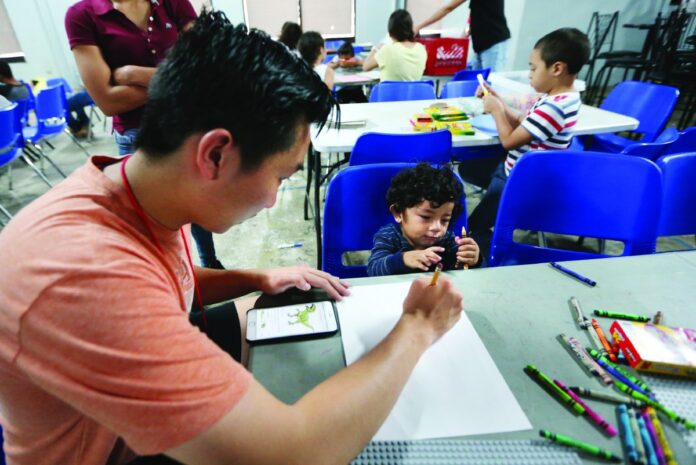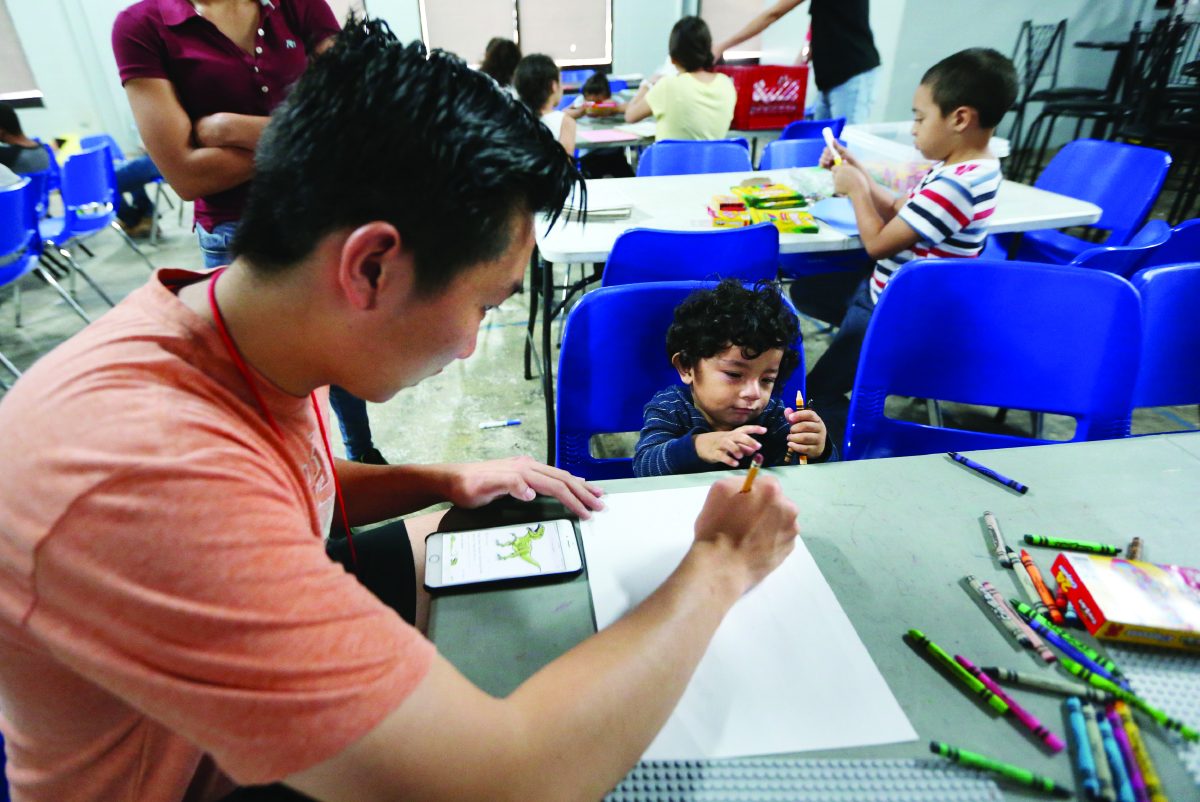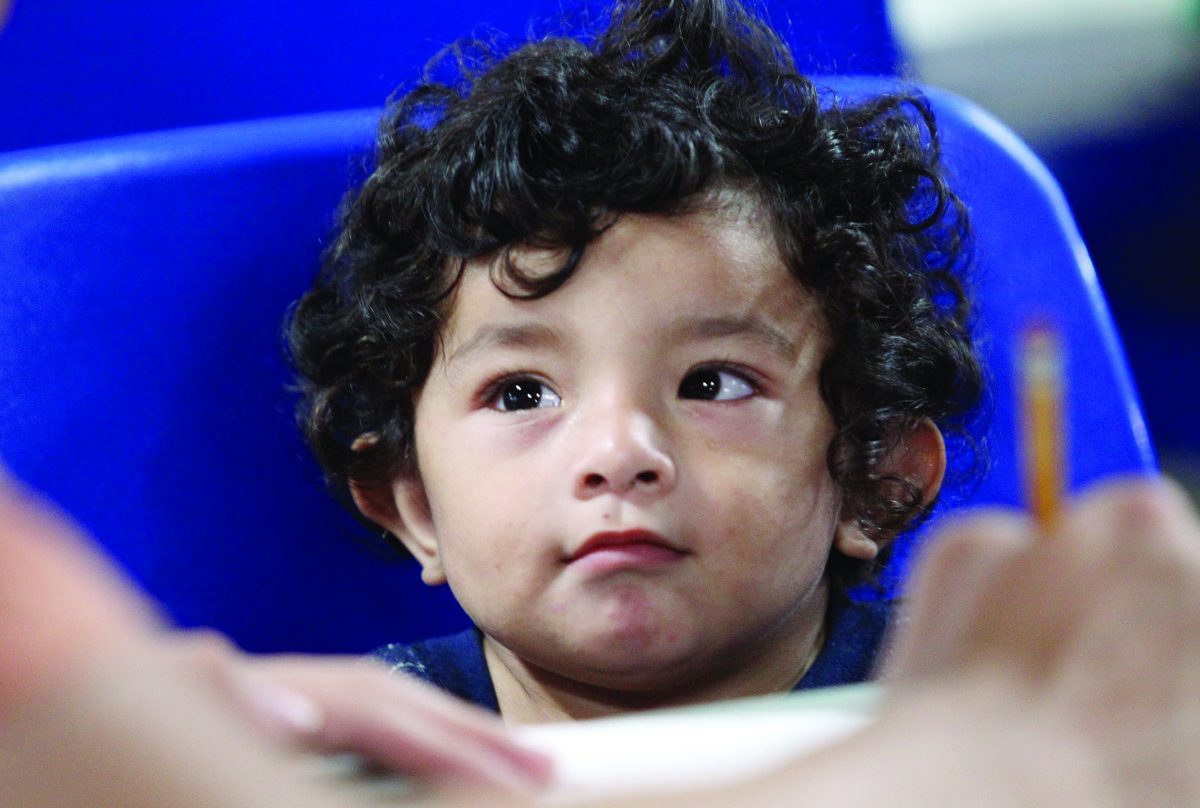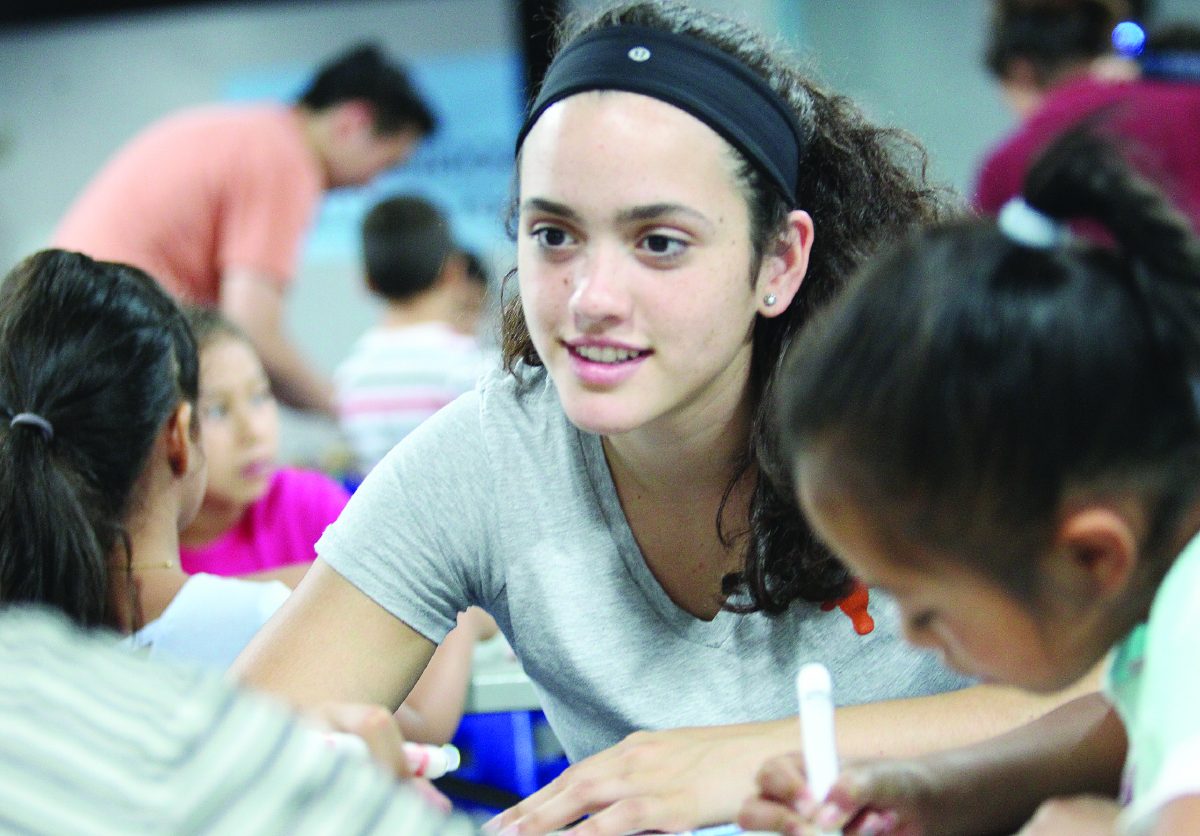
PULL-QUOTE:
“For us, Beyond the Border means that everything a child needs — attention, care, love and (an) education — shouldn’t have any boundaries to it. There really shouldn’t be anything preventing them from getting what they need.”
David Li,
Beyond the Border student group
HAMMER: A better people, a better future
BY JOHN HOANG
STAFF WRITER
McALLEN — As migrant families trickled into the Humanitarian Respite Center here Monday afternoon, a group of about eight high school students laid out Legos, colored paper and Crayons, teaching migrant children basic English skills and arts and crafts.
The students do this as a part of Beyond the Border, a recently formed student group created to address the educational and social issues surrounding asylum seekers face, but with a focus on children getting an education.
The group meets at the Catholic Charities-run respite center three days a week in two-hour blocks to teach children basic English, identifying animals, as well as arts and crafts to educate them before they embark on their journey elsewhere as migrants.
McAllen school district students, David Li, Valeria Garcia and Maddie Moore met with Sister Norma Pimentel, executive director of Catholic Charities of the Rio Grande Valley, in April to discuss their project at the respite center. This originally started as a Creativity, Activity, Service, or CAS project for the International Baccalaureate program, but evolved into something that included all McAllen ISD high schools.
Ultimately, this became a collaborative effort instead of a CAS project.
Pimentel opened the center in 2014 as a response to the crisis in Central America and assist migrants through humanitarian means, and has since aided 100,000 people. Recently, the nonprofit moved its center to the current location near the McAllen bus station.
About eight volunteers were present at the center Monday, serving migrant children of varying ages and national origins.
Li said he does not speak Spanish fluently but formed connections with the children through universal means.
“Either way, the emotions and the messages that these kids convey… transcends that language barrier,” Li said. “The way they draw, what they draw on paper, and the way they play with toys, and the way they talk to me, the way they show their dreams and aspirations, doesn’t need to be spoken in any language.”
Houses, mountains and their journey to the country were some of the things they drew, he said.
The center provided some supplies, and the Beyond the Border group received donations and spent a little money buying paper, Li said. He also brought his Legos for children to play with, as they wanted to build a “casa,” or house.
The efforts’ originated in a school setting.
Garcia said she went to the old respite center after being brought there by their teacher for a volunteer opportunity.
She, along with Li, started to brainstorm ways to help their community, starting in their area and took it further.
“These kids aren’t learning anything, they’re not doing much, and not really getting the attention that they need, or that they deserve,” she said.
The 17-year-old wanted to change that, she said.
Helping the children feel seen and valued are part of the group’s goals.
“We just wanted to make sure that they knew that they mattered to us. We wanted to make sure that they knew that; they’re youth and they’re important, Garcia said.
Her efforts also come from a personal connection, as she is a McAllen native with parents who immigrated to the United States from Mexico.
Some people may have a stereotypical view of these children, thinking they are beyond hope, Garcia said. However, they need to be encouraged and for people to “instill confidence” in them, she said.
“Anything they are given, they make something amazing out of it,” the 17-year-old high school student said, seeing their drawings and what they built.
Garcia also listened to stories of how they came to the country and her surprise of what it took, she said.
“Some of them have to come on a boat, on a raft, some of them had to walk several miles, or had to come cramped in the bottom of a car, and it’s just like stories of how they got here, and their willingness … (to) want to have a better future,” Garcia said.
The group expanded to about 15 to 20 people, which was originally started by three students, she said.
Garcia said speaking with these children also expands their perspectives.
“It’s helping us become better people as well, so we’re not only helping these kids, but these kids are helping us,” Garcia said.
Despite having to balance time and responsibilities, the children make it worth it, she said.
“Like when you teach them how to say their name in English, and they start introducing themselves to you, it’s just amazing the progress we see in these kids, and just how a little bit of attention can go such a long way,” Garcia said.
Migrants come from across Central America, from El Salvador, Honduras and other nations.
Jessica Perez, an 11-year-old from El Salvador, spoke English phrases saying her age, where she is going, with words in Spanish and English on a pink sheet of paper. Seventeen-year-old Yasmeen Medrano helped and guided her along with pronunciation and offering encouragement as she spoke.
Parents who were present lauded the efforts to teach their children.
It’s wonderful that these students are teaching children how to draw and other skills, Vanessa Rivera of Honduras said in Spanish as her 1-year-old drew with crayons.
As Li helped him draw, it was her son’s first time seeing these colored crayons, she said.
Vivian Tamez, French teacher and CAS coordinator at Lamar Academy, acts as a “facilitator” for the project and credited the students for the work.
“It’s not just donating time, the kids are donating time, but the community itself is donating supplies, what started off as something small, I think it’s grown to be something that the kids could really be proud of,” Tamez said.
Community members also moved the process along.
Pimentel welcomed the group with open arms when they met in April, Li said. The group began their lessons at the center on July 15, wanting to start in the summer after the end of previous commitments, Li said.
With the first day of school for McAllen school district starting on Aug. 26, schedules may conflict but Li said he wants the group to continue for at least a certain time during the school year.
He said he wants to continue this effort next summer, if possible.
“For us, Beyond the Border means that everything a child needs — attention, care, love and (an) education — shouldn’t have any boundaries to it. There really shouldn’t be anything preventing them from getting what they need,” Li said.
The student group encompasses its name through teaching children, no matter their background, at a location that is a crossroads for migrants, he said. Having a baseline of learning will help them find out what is important to them, and take control of their lives through “being able to be independent.”
Although Li is teaching these children, it goes both ways, as he is improving his Spanish with migrant children, many from Central American countries. He wanted to impart that “people here care,” and for the children to have better English skills.
“Our name Beyond the Border shows how education is beyond the U.S.-Mexico border; it’s beyond any border in general,” he said. “Education and love shouldn’t have any borders to it.”






